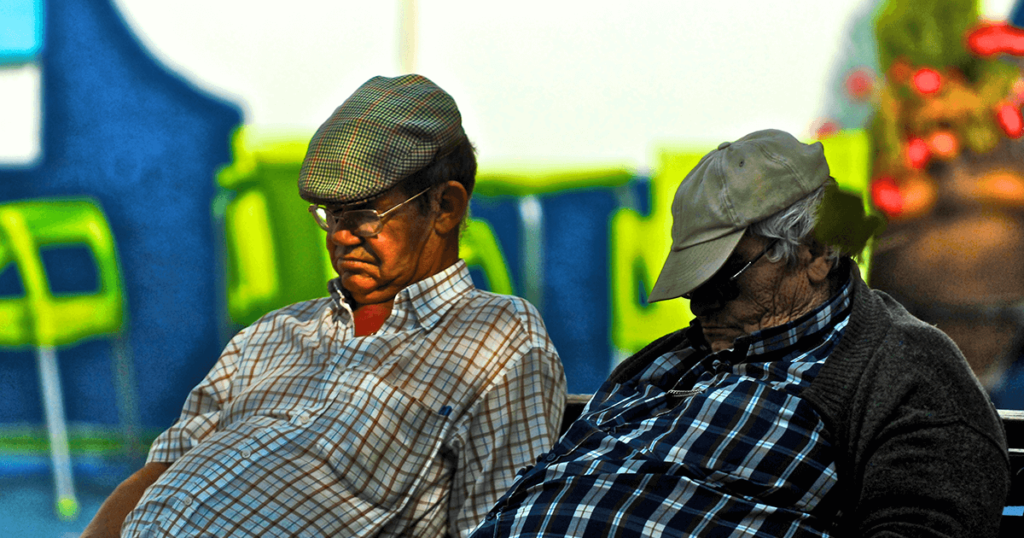
The joke I heard was about lethargic people, desganados, and I understood it perfectly. It goes like this:
One listless guy tells his listless friend he’s starting a club for people like them, a lethargic people’s club. The friend says, “Nonprofit, right?”
“That’s right, no profit motive, nor motive of any kind.”
“Well that sounds okay. Go ahead and sign me up.”
“Sign yourself up.”
I laughed, hearing it in Spanish, but I’m not sure I would have thought it funny in English. In English, told by and to Americans to gently poke fun at ourselves, the joke would have to be about workaholics, people who hop up and do something because there is no consuming reason to sit around, and not, as with this joke, their opposite, people who will sit around because there is no consuming reason to do anything else. But in Spanish, I hear jokes all the time about lazy, lethargic people, and often Andalusians, with their reputation for indolence, are the butt of the joke. To some, though, Spaniards in general seem lacking in initiative and accomplishment. A student of mine once asserted as much.
I know this student as hardworking, well-organized, and strongly motivated, and he would describe himself that way, too. But not his countrymen. The Spanish, he said one day, are a joke.
Sometimes this student comes to class tired because of all he’s done in the day. Tired or not, though, he’s never agitated by nervous energy as so many movers and shakers are, but instead is studiously calm and confident. Just the other day he said he was sure of all his answers on a grammar exercise because it made no sense not to be. If he had enough faith to pick an answer, he had enough to stick with it till proven wrong. Second guessing yourself is a bad strategy, he explained.
Wow, I thought, my mind running over the million and eight times a day I doubt myself. Would that I could reason myself into confidence! And so, faced with his supremely self-assured judgment on his countrymen, I found myself questioning my own feeling that Spaniards are relaxed, not lazy, fun-loving, not foolish. What do you mean? I said.
“Who takes Spain seriously?” he asked. “What do we do well? What are we known for?”
Music, I said, naming Andrés Segovia and his guitar, but also thinking of Montserrat Caballé, Paco de Lucía, El Último de la Fila, Plácido Domingo. And painting, I said, and there I didn’t know who to mention, there are so many names. And literature. And film.
Yes, yes, my student said, waving his hand. But science, technology?
Someone had told me about a cancer therapy originating in Spain. But as I was about to mention medicine, too, I recalled Camerón de la Isla and Tomatito, a flamenco singer and a guitarist who collaborated from the late ’70s until the early ’90s, when Camerón fell ill. I remember hearing shortly after that he’d gone to New York in a fog of secrecy, come back, and died. He was 42. So much for the Spanish expertise in cancer treatment. Well, so much for the New York cure, too.
Camerón and Tomatito came from Andalusia, that land of desganados, where the principal aspiration, it’s said, is to sit around all day in a dim café, drinking and smoking and leaving the heavy work to others. To someone hurrying by on the way to a job, the two of them, with a guitar among a crowd of friends, would have appeared indolent, though to anyone who has tried to master an art, the hours of practice look anything but lazy. Still, they might have made ideal members of the club, being apparently without a lust for lucre since, for all their renown, they never made a fortune. “Sign us up, Tomatito, why don’t you,” Camerón might have said with a shrug, and Tomatito, guitar on his knee and lifting a cup, might have answered, “Okay, why not? When I’ve got this song right.”
But maybe not. They might have been too engaged in doing what looks like nothing much to those who prefer a bigger stage and brighter lights. In the end, whatever club you join, it’ll always look to someone like the wrong club. The problem is when it looks that way to yourself. It’ll seem then you’ve forgotten to live. Julio Iglesias, who has enjoyed a very large stage, sang about it in one of his hits: “Me olvidé de vivir.” “De tanto correr por la vida sin freno,” he sings, from hurrying through life with the brakes off, from wanting to be best in everything, from living on applause, from shouting his songs into the wind, from wanting to discover something new every day, he forgot to live. “De tanto correr por ganar tiempo al tiempo,” he sings, from hurrying to steal time from time. Listen to it. Unless you’re listening to something else.

